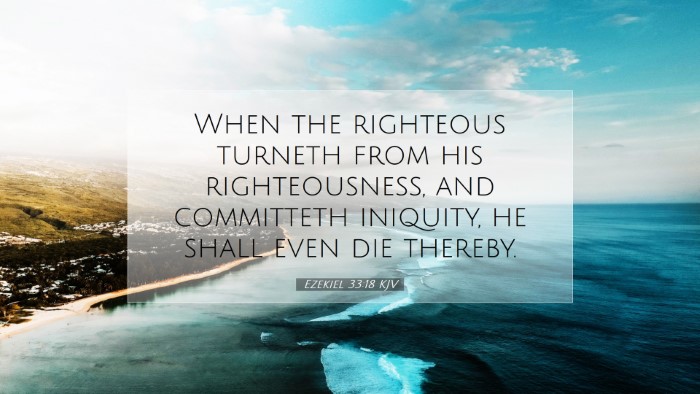Bible Commentary on Ezekiel 33:18
Ezekiel 33:18: "When the righteous turneth from his righteousness, and committeth iniquity, he shall even die thereby."
Introduction
The verse under consideration provides significant insights into the nature of righteousness, the conditional aspect of salvation, and the gravity of moral choices. The context of Ezekiel’s ministry emphasizes accountability before God, especially in the light of Israel's impending judgment and the nature of repentance and righteousness.
Contextual Background
Ezekiel was called to be a watchman for the house of Israel (Ezekiel 33:7), a role which involves not only warning the people but also proclaiming the importance of moral integrity. This particular verse falls within a section where God, through Ezekiel, is emphasizing personal responsibility and the consequences of turning away from righteousness.
Commentary Insights
-
Matthew Henry's Commentary
Henry underscores the seriousness of turning from righteousness. He asserts that no amount of previous good deeds can shield one from the consequences of sin when they abandon their moral standing. This reflects the justice of God and emphasizes that individual righteousness must be maintained actively.
-
Albert Barnes' Notes
Barnes offers insight into the divine justice conveyed in this verse. He argues that the verse serves as a warning that even those who have lived righteously can face severe consequences for turning to sin. The essence of righteousness is dynamic, and a lapse into iniquity signifies a profound spiritual danger, reinforcing the necessity of continual vigilance in one's moral conduct.
-
Adam Clarke's Commentary
Clarke notes that this verse speaks to the transient nature of righteousness. He highlights that turning from righteousness does not merely mention physical death but suggests spiritual death and separation from God. He emphasizes that the choices an individual makes dictate eternal outcomes and that grace offers a path back, though it is not guaranteed that the previously righteous will return.
Theological Implications
This verse opens several theological avenues for discussion regarding sin, judgment, and grace. It prompts us to consider the multifaceted nature of God's justice, mercy, and the believer's role in responding to divine commandments.
Righteousness and Holiness
Righteousness is not a static state but requires commitment and action. The requirement to persist in holiness reflects the biblical standard found throughout Scripture where God calls His people to a lifestyle of obedience (1 Peter 1:15-16).
Judgment and Accountability
The accountability emphasized in this verse points to the broader biblical theme of judgment. God's evaluation is not based merely on past deeds but on the present reality of one's choices. This accountability invites self-examination and a commitment to spiritual growth.
Grace and Repentance
While the verse presents a stark warning, it also invites reflection on the nature of God's grace. The possibility of repentance remains, suggesting that a return to righteousness is always available, even for those who have strayed (James 5:19-20). However, the urgency of turning from sin is made clear – procrastination can have severe consequences.
Practical Applications
For pastors and leaders, this verse can serve as a point of warning in teaching congregants about the seriousness of sin and the importance of maintaining a lifestyle of righteousness. It is an invitation to preach not just grace, but a balanced message of God's holiness and the necessity of responsive living.
-
Encouraging Vigilance: Leaders should encourage members to remain vigilant in their spiritual lives, emphasizing the need to guard against complacency that could lead to moral failure.
-
Teaching on Repentance: Regularly integrating teachings on repentance and the need for continual return to God’s ways can help prevent deterioration of faith and moral standing.
-
Modeling Righteousness: Leaders must model righteousness, demonstrating that faith is active and that righteous living is both a privilege and a responsibility.
Conclusion
Ezekiel 33:18 stands as a deeply convicting reminder of the path of righteousness, the dangers of turning away, and the importance of maintaining one’s commitment to God. It calls for a response that encompasses both awareness of spiritual truths and a commitment to live faithfully according to them.


